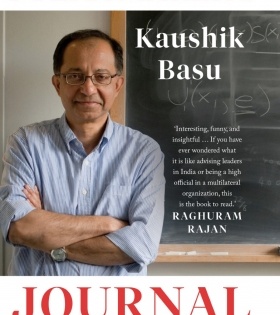An entertaining narrative of inner-workings of Indian politics, policy
By IANS | Published: June 20, 2021 12:48 PM2021-06-20T12:48:04+5:302021-06-20T13:00:24+5:30
New Delhi, June 20 Irreverent and hilarious, wise and introspective, Kaushik Basus "Policy Makers Journal" (Simon & Schuster) ...

An entertaining narrative of inner-workings of Indian politics, policy
New Delhi, June 20 Irreverent and hilarious, wise and introspective, Kaushik Basus "Policy Makers Journal" (Simon & Schuster) records the course of his career over seven years, first in India as the Chief Economic Adviser and after that as the Chief Economist at the World Bank in Washington.
Encounters with expected and unexpected world leaders and influencers, Manmohan Singh, Narendra Modi, Barack Obama, Sheikh Hasina, Deepika Padukone and many, many others—pepper and liven this charming page-turner of a journal.
The Indian years were a period of high inflation, growth challenges (as the global financial crisis arrived in India) and also a remarkable growth recovery story, with India moving past China's GDP growth rate. There were corruption scandals causing widespread street protests, plenty of late-night decision-making which one knew would rock the stock market the next day and getting to know politic who were outstanding as statesmen in the midst of all this, as well as many who were not.
The World Bank years ranged from interacting with officials in tiny, remote countries like Samoa, to gigantic nations with considerable heft, such as China. It entailed sitting down with leading researchers to compute and announce global numbers on extreme poverty and rankings on how easy it is to do business in different countries (fully aware that there would be calls from irate finance ministers as soon as these were published), and assisting quarrelling nations to communicate amicably and coordinate on policy.
Basu narrates these momentous periods in his diplomatic career with a rare light-heartedness which not only informs by giving the readers a ringside view of Indian bureaucracy, but also makes this the most compelling and enjoyable book on policymaking to come out of India in years.
"Kaushik Basu's irreverent diary of his days as a policymaker, both in India as the Chief Economic Adviser and at the World Bank in Washington as the Chief Economist, manages to be interesting, funny, and insightful, all at the same time. The reader gets a ring side view of how the policy sausage is put together, and intriguing vignettes about the key makers. If you have ever wondered what it is like advising leaders in India or being a high official in a multilateral organization, this is the book to read," says former RBI Governor Raghuram Rajan.
"Almost invariably penned by dutiful friends, blurbs for memoirs are rightly untrusted. Not in this case! Kaushik Basu and I have met only briefly. So you can take it from me: Basu's diary of seven years in New Delhi and at the World Bank is a masterpiece of wit and insight, with a panoramic view of his profession, of the Indian political scene, of bureaucratic comedy, and of economic and social conditions all over the world. It's a brave economist, who dares to reveal such a talent for prose," says economist James K. Galbraith, whose father, John Kenneth Galbraith, served as US Ambassador to India 1961-63.
Kaushik Basu is professor of Economics and Carl Marks Professor of International Studies at Cornell University. He is currently serving as president of the International Economic Association.
A fellow of the Econometric Society, Basu has published widely in the areas of development economics, industrial organization, game theory and political economy. His books include "The Republic of Beliefs: A New Approach to Law and Economics".
Early in his career, Basu was a professor at the Delhi School of Economics, where in 1992 he founded the Centre for Development Economics and served as its first executive director.
Disclaimer: This post has been auto-published from an agency feed without any modifications to the text and has not been reviewed by an editor
Open in app